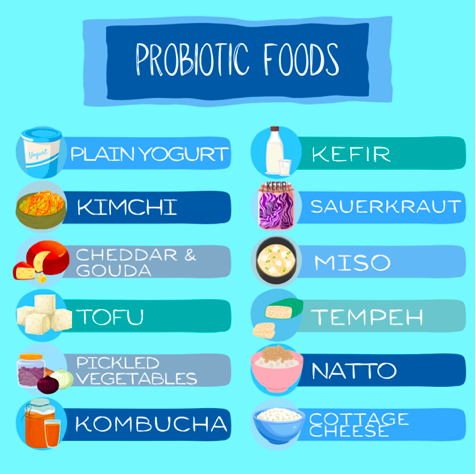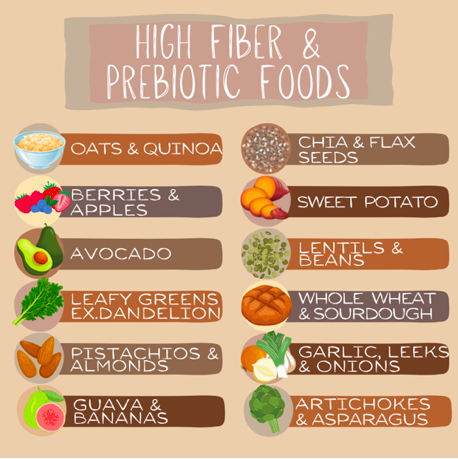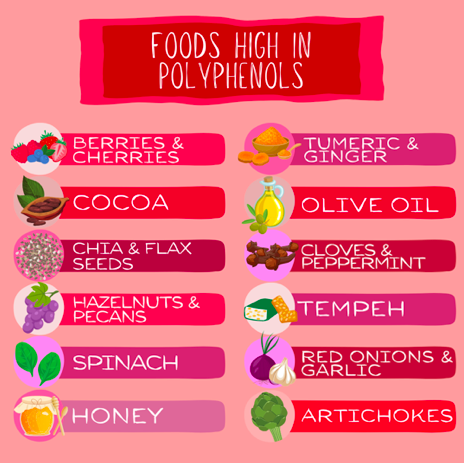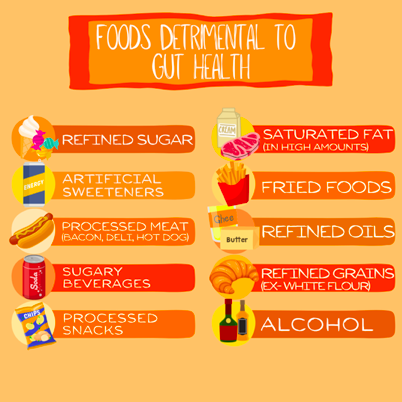by Jacqueline Rogers, Dietetic Intern
The role of the microbiome in health is an exciting topic that we are learning more about each day. The human microbiome consists of all of the microbes and their genomes that live on and inside us. This includes largely fungal, viral, and bacterial material. In the digestive system alone, in what is referred to as the ‘gut microbiome’, there are 300-1000 different bacterial species that make up 39-100 trillion bacterial cells [i]. These microbiota affect many different bodily functions, including immunity [i,ii]. Disruption in function or composition of the gut microbiome leading to a less diverse and less stable microbiota is known as dysbiosis [i,iii]. Dysbiosis is influential in the development of different conditions and diseases, including cancers, because the disruption can result in impaired immune responses [i,iii]. An impaired immune response is also associated with poor response to cancer therapies, highlighting the important role that the gut microbiome plays in not only cancer onset and progression, but in the response to treatment as well [i].
In general, those with a more diverse microbiome prior to cancer treatment are more likely to respond positively to treatment and less likely to see cancer progression [i,ii,iii]. More specifically, there are certain microbiota whose presence or absence have been found to play a role in the body’s anti-cancer immune response [i]. Therefore, building a healthy diversity of specific microbiota prior to and following treatment is crucial. These specific microbes have been found to include certain species in the Faecalibacterium, Bifidobacterium, Clostridiales, and Ruminococcaceae genus [i,ii,iii]. Significant alteration in gut microbiota can be made through dietary change and adherence [i]. There are three categories with four dietary components that this article will focus on; fiber, prebiotics and probiotics, and polyphenols. Increased consumption of all have been shown to be able to promote beneficial changes to the microbiome in cancer patients that are either in pre or post treatment periods.
Probiotics
The first dietary component is probiotics. Probiotics are live microorganisms that are non-pathogenic and can help keep the gut healthy when given in optimal quantities [ii,iv]. Among sources are fermented dairy, vegetables, and soy foods [iv, v]. Probiotics contain high amounts of Lactobacillus, Lactococcus, Bifidobacterium, and Enterococcus [iv,v]. They help prevent toxin and carcinogen conversion, support the immune system, produce anti-inflammatory molecules, and prevent mutations [iv]. By doing so, probiotics and fermented foods have been linked to tumor development delay, anti-proliferation of cancerous cells, and significant reduction in adverse side effects of cancer treatments [iv].

Fiber and Prebiotics
Dietary fibers and prebiotics are categorized together because they are both resistant to digestion, and because all prebiotics are fiber [vi,vii]. This means that some fiber foods, although not all, contain prebiotic properties. Prebiotics are fermentable in the colon, and selectively stimulate the growth of healthy gut bacteria. They are found in various foods including fruits, vegetables, legumes, whole grains, nuts, and cereals [vi,vii,viii]. Increasing these dietary components have been found to increase levels of Faealibacterium prausnitzii, Clostridium cluster XVIa, lactobacilli, and bifidobacteria [vi,vii,viii]. Consumption of both fermentable fiber and prebiotics promote the production of metabolites known as short chain fatty acids (SCFAs) [vi,vii,viii]. SCFAs are crucial for the maintenance of gut microbiome health as they have anti-inflammatory and anti-neoplastic properties, both of which are essential for fighting cancer [vi,vii,viii].

Polyphenols
The last dietary component, polyphenols, are secondary metabolites that work as antioxidants [ix]. They come from plant-based sources including fruits, vegetables, nuts and seeds, beans, soy, herbs and spices, and cereals [ix]. Dietary polyphenols can further be subcategorized into flavonoids, stilbenes, lignans, phenolic acids, and more [ix]. Polyphenols adjust the microbiota composition through a prebiotic effect after they are broken down in the colon [ix]. They do so by preventing the growth of health-demoting microbes such as Bacillus spp., H. pylori, and others, while increasing health-promoting microbes including Lactobacillus spp., Bifidobacterium spp., and Akkermansia spp [ix]. Polyphenols are able to influence immune cells to better recognize tumor cells, giving them anti-tumor proponents. They also possess anti-inflammatory and antioxidant components [ix].

Foods the May Worsen Gut Health
A diet lacking in nutrients can also influence the gut microbiome. Consistently eating certain foods may contribute to dysbiosis by increasing bad gut bacteria species and decreasing good gut bacteria [i,ii,iii]. In contrast to the dietary components discussed above, this may lead to increased cancer progression and decreased treatment success [i,ii,iii]. Foods found to be detrimental to gut health include: processed foods, fried foods, foods high in saturated fats, antibiotic meats, alcohol, refined sugars, refined grains, and artificial sweeteners [x,xi].

References:
[i] Gopalakrishnan V, Helmink BA, Spencer CN, Reuben A, Wargo JA. The Influence of the Gut Microbiome on Cancer, Immunity, and Cancer Immunotherapy. Cancer Cell. 2018;33(4):570-580. doi:10.1016/j.ccell.2018.03.015
[ii] Lu K, Dong S, Wu X, Jin R, Chen H. Probiotics in Cancer. Front Oncol. 2021;11:638148. doi:10.3389/fonc.2021.638148
[iii] Cheng WY, Wu CY, Yu J. The role of gut microbiota in cancer treatment: friend or foe? Gut. 2020;69(10):1867-1876. doi:10.1136/gutjnl-2020-321153
[iv] Legesse Bedada T, Feto TK, Awoke KS, Garedew AD, Yifat FT, Birri DJ. Probiotics for cancer alternative prevention and treatment. Biomed Pharmacother. 2020;129:110409. doi:10.1016/j.biopha.2020.110409
[v] Zhang K, Dai H, Liang W, Zhang L, Deng Z. Fermented dairy foods intake and risk of cancer: Fermented dairy foods and cancer risk. Int J Cancer. 2019;144(9):2099-2108. doi:10.1002/ijc.31959
[vi] Spencer CN, McQuade JL, Gopalakrishnan V, et al. Dietary fiber and probiotics influence the gut microbiome and melanoma immunotherapy response. Science. 2021;374(6575):1632-1640. doi:10.1126/science.aaz7015
[vii] Enam F, Mansell TJ. Prebiotics: tools to manipulate the gut microbiome and metabolome. J Ind Microbiol Biotechnol. 2019;46(9-10):1445-1459. doi:10.1007/s10295-019-02203-4
[viii] Biswas V, Praveen A, Marisetti AL, et al. A Mechanistic Overview on Impact of Dietary Fibres on Gut Microbiota and Its Association with Colon Cancer. Dietetics. 2022;1(3):182-202. doi:10.3390/dietetics1030017
[ix] Cueva C, Silva M, Pinillos I, Bartolomé B, Moreno-Arribas MV. Interplay between Dietary Polyphenols and Oral and Gut Microbiota in the Development of Colorectal Cancer. Nutrients. 2020;12(3):625. doi:10.3390/nu12030625
[x] Rinninella, Cintoni, Raoul, et al. Food Components and Dietary Habits: Keys for a Healthy Gut Microbiota Composition. Nutrients. 2019;11(10):2393. doi:10.3390/nu11102393
[xi] Zhang N, Ju Z, Zuo T. Time for food: The impact of diet on gut microbiota and human health. Nutrition. 2018;51-52:80-85. doi:10.1016/j.nut.2017.12.005
